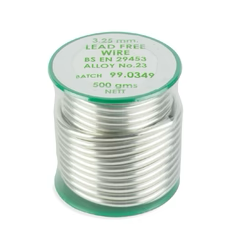Last Updated: Sunday, 11th February 2024
Copper Fittings and Solder Wire: A Comprehensive Guide
When it comes to soldering, choosing the right solder is crucial. Different types of solder will vary with their jointing strength, but it is imperative that you consider the health implications of each type also. In this comprehensive guide, we'll explore copper solder, how to choose the right solder wire, and tips for using solder wire effectively.
What is Solder Wire?
Soldering wire is a type of solder that is used to permanently join copper and other metals together. It is typically composed of a mixture of metals, including copper and tin, and sometimes other metals like lead, silver or antimony. The specific composition of the solder can vary depending on the intended application.
There are two main types of solder wire for plumbing: leaded and lead-free. Leaded solder is easier to work with due to its lower melting point. However, due to health concerns, lead-free solder is now the standard for plumbing and any other applications that are used to join pipes carrying drinking water.

Lead Free Solder Wire 500g Pack
£32.50
In Stock Now
How to Choose the Right Solder Wire
Choosing the right solder wire is essential for complying with regulation whilst achieving a strong and reliable joint. Here are some factors to consider when selecting solder wire:
Type of Project: The type of project you're working on will influence your choice of solder wire. For example, plumbing projects which handle drinking water require lead-free solder.
Operating Conditions: Different combinations of solder have different strengths. Technical information from Flowflex shows how different types of solder can impact the recommended working conditions for their products.
Melting Point: The melting point of the solder wire is another important consideration. Leaded solder has a lower melting point than lead-free solder, making it easier to work with. However, lead-free solder is safer and more environmentally friendly.
Tips for Using Copper Solder Wire
Using copper solder wire effectively requires proper technique and attention to detail. Here are some tips to help you achieve strong, reliable solder joints:
Clean the Surfaces: Before soldering, clean the surfaces to be joined with a wire brush or sandpaper. This removes any oxidation and will ensure a clean, strong joint.
Heat the Joint: Use a propane torch or soldering iron to heat the joint evenly. Avoid overheating, as this can damage or deform the materials being soldered.
Apply the Solder: Once the joint is heated, touch the solder wire to the joint. The solder should melt quickly, and through capillary action, flow freely into the joint, filling any gaps.
Let it Cool: After soldering, let the joint cool naturally. Avoid using water or other cooling methods, as this can cause the solder to crack.
Inspect the Joint: Once the joint has cooled, wipe it down to remove any excess flux and residue. Inspect the joint for any gaps or imperfections. If necessary, reheat the joint and add more solder.
Conclusion
Soldering copper fittings is a historic and well used technique for joining copper pipes. By choosing the right solder wire and using proper soldering techniques, you can achieve strong, reliable solder joints that will last for years to come.
Frequently asked questions
What are the types of solder wire for plumbing?
There are two main types of solder wire for plumbing: leaded and lead-free. Leaded solder is easier to work with due to its lower melting point, but due to health concerns, lead-free solder is now the standard for plumbing and any other applications that are used to join pipes carrying drinking water.
How do I choose the right solder wire?
When choosing solder wire, consider the type of project, operating conditions, and melting point. Plumbing projects handling drinking water require lead-free solder. Different solder types have different strengths, so check manufacturer technical information for recommended working conditions. Leaded solder has a lower melting point than lead-free solder, making it easier to work with, but lead-free solder is safer.
Why is lead-free solder recommended for plumbing projects?
Lead-free solder is recommended for plumbing projects due to health concerns associated with lead exposure in drinking water. Therefore, lead-free solder is the standard for plumbing and any other applications that are used to join pipes carrying drinking water.
Any more questions?
If you have any queries or questions about the products we sell, or even your next project, give us a shout! We'll try our best to give you a hand.